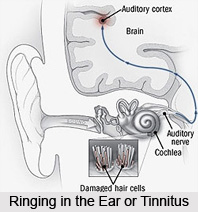 Ringing in the ear or tinnitus is a type of problem, though not extremely dangerous or serious, occurs in the ear. The term `Tinnitus` basically comes from the Latin word `tinnitus` meaning ringing or buzzing in the ears. Tinnitus cannot be called a typical ear disease but a condition that can result due to various underlying causes.
Ringing in the ear or tinnitus is a type of problem, though not extremely dangerous or serious, occurs in the ear. The term `Tinnitus` basically comes from the Latin word `tinnitus` meaning ringing or buzzing in the ears. Tinnitus cannot be called a typical ear disease but a condition that can result due to various underlying causes.
This condition can occur to anyone but there are certain people who are more likely to develop tinnitus. The white people, adults over the age of 65 and those with age-related hearing loss are some of them who are prone to this condition.
Causes of Tinnitus
The causes of Tinnitus are many but the most common causes of tinnitus include age-related hearing loss, exposure to loud noises, earwax blockage in the ear canal, and abnormal bone growth in the ear. The other serious causes comprise of neurological damage, ear infections, oxidative stress, emotional stress, foreign objects in the ear, and nasal allergies that prevent fluid drain. Withdrawal from benzodiazepines may also cause tinnitus or it may be observed as a side effect of certain medications. Blood vessel disorders that cause tinnitus include head and neck tumours, atherosclerosis, high blood pressure, turbulent blood flow, and a malformation of capillaries.
Problems like inner ear disorder called Meniere`s disease, stress and depression, head or neck injuries, and a benign tumour of the cranial nerve called acoustic neuroma also invite tinnitus. But these causes are less common.
Symptoms of Tinnitus
A person can feel the problem of tinnitus through different symptoms. The ears may sense ringing, buzzing, roaring, clicking, whistling, hissing, or squealing. Then the person may also hear sound when actually there is no external sound present. Sometimes noise may appear low or high in pitch and may interfere with a person`s ability to concentrate.
Treatment of Tinnitus
This condition is difficult to treat. However, if the real cause can be detected and treated, the problem is likely to be remedied. The primary treatment for tinnitus is talk therapy and sound therapy. A doctor may suggest some methods of suppressing the sound. White noise machines, hearing aids, and masking devices, may be offered as they are capable of suppressing sounds, making the tinnitus less annoying. Although drugs cannot cure tinnitus, some such as tricyclic antidepressants, alprazolam, and acamprosate may lesson the severity of symptoms.
Otherwise, the ideal treatment for tinnitus is a type of counselling called cognitive behavioural therapy (CBT) which can be delivered via the internet or in person. This therapy decreases the amount of stress those with tinnitus feel. The consequences of this therapy appear to be independent of any effect on depression or anxiety in an individual. Relaxation techniques may also be useful.
Prevention of Tinnitus
Ringing in the ear or tinnitus can be prevented if proper measures are taken at the right time.
•Limit or avoid exposure to loud noises, such as music, power tools, gunshots, and industrial machinery.
•It is advisable to wear protective earplugs or earmuffs if one cannot avoid loud noises.
•Avoid using wadded-up tissue or cotton balls as they may become lodged in the ear canal.
•When using stereo headphones make sure that the sound is not too loud.
•Avoid products that contain nicotine as they may cause tinnitus by reducing blood flow to the structures of the ear.




















